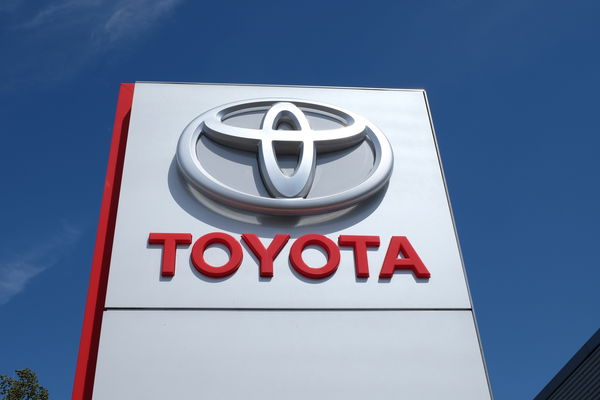
via Imago
Toyota logo outside a dealership. Netherlands – April 30, 2017 More: Original public domain image from Flickr [https://www.flickr.com/photos/dennism2/34478836051/]

via Imago
Toyota logo outside a dealership. Netherlands – April 30, 2017 More: Original public domain image from Flickr [https://www.flickr.com/photos/dennism2/34478836051/]
In a thrilling convergence of innovation and ambition, Toyota is forging ahead in both the motorsport and aerospace arenas as it boldly explores its future. With a promising start in the 2024 NASCAR Cup Series and a budding partnership with Haas in Formula 1, the automotive giant is positioning itself to potentially make a significant return to the world of Grand Prix racing.
Simultaneously, Toyota is investing heavily in the space sector, collaborating with the Japan Aerospace Exploration Agency to develop a lunar rover and partnering with the startup Interstellar Technologies to produce lightweight rockets. As the company navigates these diverse challenges, the unfolding narrative of Toyota’s endeavors reflects a visionary approach to mobility that transcends traditional boundaries.
ADVERTISEMENT
Article continues below this ad
Toyota’s return to F1 – the why, what, and how
Toyota is making strides in the 2024 NASCAR Cup Series, with Tyler Reddick achieving three victories in the No. 45 Toyota and coming close to winning the championship. Additionally, Denny Hamlin and Christopher Bell from Joe Gibbs Racing also enjoyed multiple wins. Beyond racing, Toyota’s ambitions extend to space exploration. In collaboration with the Japan Aerospace Exploration Agency (JAXA), the company is developing a lunar rover for NASA’s Artemis program. As it competes with leaders like Elon Musk and SpaceX, Toyota aligns its efforts with the Japanese government’s initiative to boost the private space sector, targeting 30 space launches annually by the early 2030s after successfully completing three launches in 2023.
And, now, in recent news, Motorsports.com said on X, “Toyota is now “gradually moving” towards a full-scale return to #F1 after its technical partnership with Haas began in 2024, says the director of its sportscar and rallying squad.”
In a significant change to its messaging strategy, the director of Toyota’s sportscar and rallying division has indicated that a return to Formula 1 could be possible following the partnership agreement with Haas, which takes effect after 2024. The collaboration between Haas and Toyota began during the latter part of last season when the Japanese manufacturer’s branding was featured prominently on the American team’s vehicles and merchandise.
So, what’s on the cards?
The two organizations have also initiated Haas’s inaugural Testing of Previous Cars (TPC) development program and are in the process of constructing a new F1 simulator at Haas’s facility in Banbury. When the partnership was first announced last October, Masaya Kaji, director of global motorsport for Toyota Gazoo Racing, stated that there was “no plan” for the company to produce its own F1 engine or to return as a works team, a role it held from 2002 to 2009.
But what does the scope of Toyota’s involvement look like?
What’s your perspective on:
Is Toyota's return to F1 a game-changer, or just another corporate gamble?
Have an interesting take?
At that time, Toyota had made it clear that its involvement in Formula 1 with Haas was limited to aiding its engineers in understanding the championship’s processes and potentially paving the way for one of its drivers to compete in grand prix racing. Meanwhile, Toyota World Endurance Championship driver Ryo Hirakawa would be joining Alpine as a reserve driver for the 2025 season—with aspirations of eventually racing in Formula 1.
ADVERTISEMENT
Article continues below this ad
Toyota’s space ambitions
Toyota is advancing its goals by investing ¥7 billion (about $44.4 million) in the Japanese startup Interstellar Technologies (IST). This partnership aims to mass-produce lightweight rockets to compete with major players like SpaceX. With support from its subsidiary Woven, Toyota will gain a seat on IST’s executive board.
IST plans to use automotive expertise, including Toyota’s efficient production methods, to create a high-quality, cost-effective manufacturing process for rockets. During his speech at CES in Las Vegas, Chairman Akio Toyoda emphasized that Toyota’s interest in the space sector reflects a broader vision for the future of mobility, stating, “The future of mobility shouldn’t be limited to just cars.” IST made history in 2019 as the first Japanese company to launch a commercially developed rocket into space.
This investment comes as Toyota signals its ambitions in both transportation and aerospace.
ADVERTISEMENT
Article continues below this ad
What are your thoughts on Toyota’s dual focus on motorsport and space exploration? Do you think this strategy will help them redefine the future of mobility?
ADVERTISEMENT
ADVERTISEMENT
ADVERTISEMENT
ADVERTISEMENT


Is Toyota's return to F1 a game-changer, or just another corporate gamble?